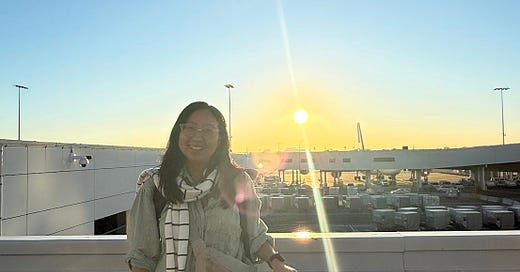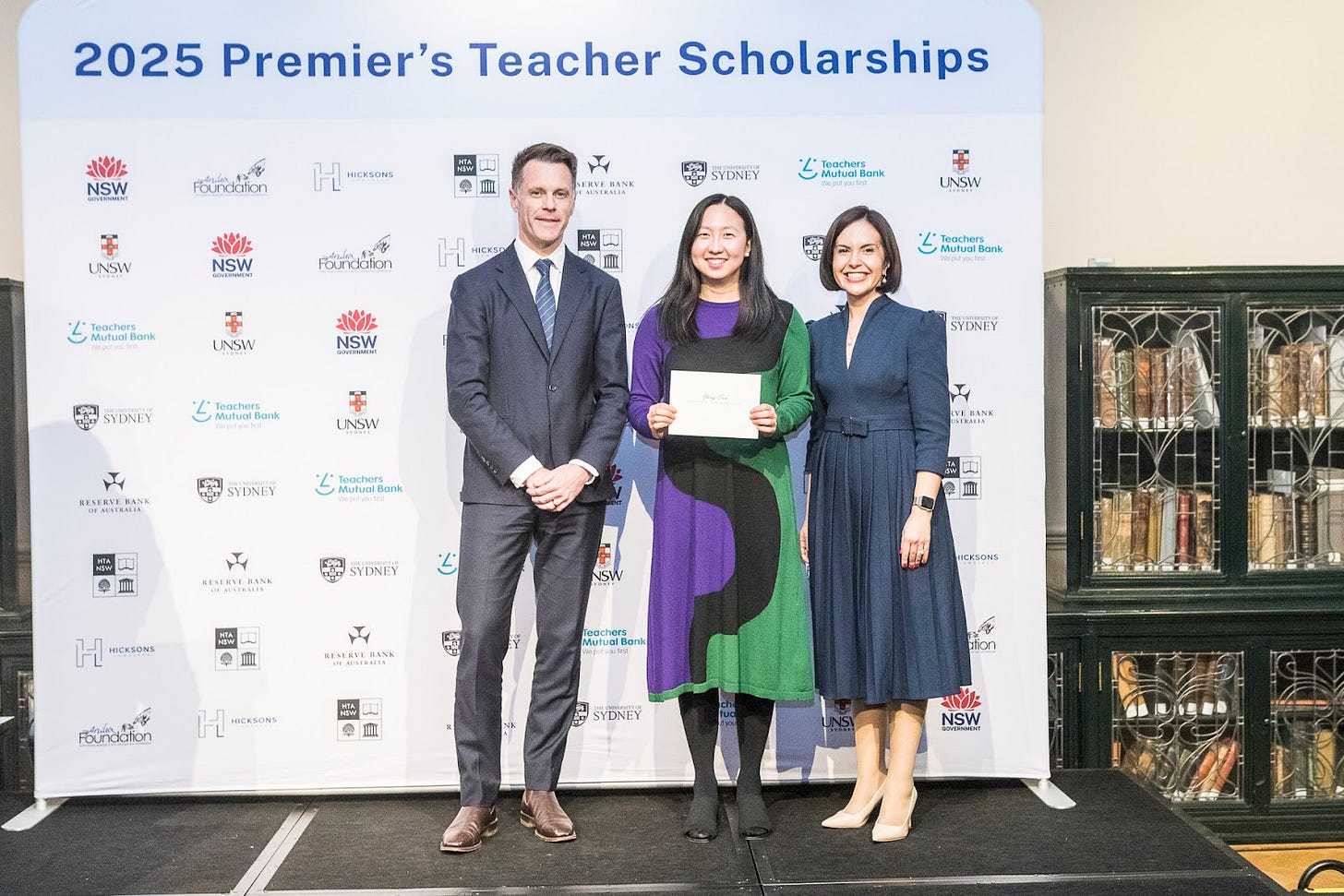1. The Birth of Teach Us Wellbeing
How did I get here? What am I aiming to achieve? Where am I going?
Dear reader,
Thank you for gracing me with your undivided attention for the next five to ten minutes depending on your reading speed and the notification ‘pings’ on your phone.
Let us go, you and I, on a journey of how Teach Us Wellbeing came into inception.
On a crisp February morning last year, my principal at Marist College Eastwood – Silvana Rossetti stood in front of us and read out thank you messages, birthday wishes and important staff announcements. Like always, I sat in the front row, usually on my own (I’m still not sure why people are so ‘scared’ of the front row, I mean they’re often the most expensive seats in theatres, sporting games and concerts), pen in one hand and notebook in the other, ready to jot down anything that I’d need to add onto the world’s longest to-do list.
I don’t know why, but something caught my attention that day – it was a callout for any staff who may be interested in the New South Wales Premier’s Teacher Scholarships. To be honest, this was something I’d never even heard of despite being in the New South Wales education landscape for more than fifteen years. Silvana ended this particular announcement with a warm and welcoming note: “Any staff who may be interested, please come and see me.” (Of course, she’d said that, my principal is someone who always encourages her staff to take on opportunities that expand their horizons as educators and building collective efficacy whenever possible.)
That night, after dinner, I sat at my desk scrolling through the variety of scholarships that were on offer. The University of Sydney Mathematics Scholarship: are you joking? The Reserve Bank of Australia Economics Scholarship: yeah right… The History Teachers’ Association Scholarship: maybe.
But my mouse circled, paused and then I clicked on The Anika Foundation Youth Depression Awareness Scholarship. It was like the green light in ‘The Great Gatsby’, silently beckoning me with blinding rays, watching my every decision and indecision. Then a conversation that took place the week before drew me across the water, closer to the cooling light.
After class one day, a student in my class disclosed that he was struggling with his home life and friendship group. Is this rare? Absolutely not. In fact, it is extremely common. I mean I still struggle with my life in general as a mid-thirty edging closer to a forty-year-old ‘adult’. After the student’s initial conversation with me, I logged the conversation into our school portal as a ‘Wellbeing Observation’ and went to see our college counsellor who is an experienced, compassionate and empathetic human being.
Our conversation began with her being extremely understanding of the student’s ongoing struggles with the pressures of school and demands of their home life, feelings of loneliness and a lost sense of direction. Though, she informed me in a regretful tone that this student will have to go on her waiting list, the waiting list is huge, and it may be weeks before this student could get an appointment with her.
What happened here wasn’t the student’s fault, it wasn’t the school counsellor’s fault, it wasn’t my fault, but our education system has failed the student. We have one school counsellor for over 900 students and the recommended ratio is 500 students per one psychologist/counsellor at any school in Australia (recommended by the Australian Psychology Society) and 250 students per one psychologist/counsellor at any school in America (recommended by the American School Counselor Association). Do I need to repeat those statistics?
According to The World Happiness Report (2023) published by the Wellbeing Research Centre at Oxford University, “The best predictor for adult life satisfaction is subjective well-being and emotional health during childhood”. However, the future life satisfaction trend of Australian children and adolescents is extremely dire. How do we know this?
Well, have a look at the graph below from the Australian Institute of Health and Welfare where the sharp increase (represented in orange) in individuals aged 15-34 diagnosed with depression or anxiety disorder is a stark contrast to other serious illnesses.
For over two months, I edited and finalised my application with the assistance of Silvana who provided valuable feedback along the way and then, I received the call from the wonderful team at NSW Education Premier Teacher Scholarships. I’d been given a golden ticket of $15,000.00 to conduct research nationally and/or internationally for youth mental health. (Sorry Charlie, but this is going to be way better than a trip to the Willy Wonka Chocolate Factory.)
So, what am I hoping to achieve on this five-week study tour?
I aim to write a research report that seeks to bridge the gap between wellbeing research and wellbeing practice. Hopefully this report will provide educators with practical research-based strategies they can implement to build awareness of wellbeing and mental health in schools. From visiting schools, universities and research labs to attending conferences, these invaluable experiences will be the guiding paths that lead me to the writing of the final research report. According to the 2022 Black Dog Institute report ‘Turning the Tide on Depression: A vision that starts with Australia’s youth’, “Schools are a vital part of the solution” in combating adolescent mental illnesses as educational settings are the physical places that young people spend most of their time in. Therefore, it is vital that educators are well equipped with the professional knowledge and skills to provide holistic support to adolescents rather than predominantly focussing on an academically dense curriculum.
Do I love dissecting metaphors, metafiction and monologues? Absolutely. (Sorry for the terrible alliteration, I just couldn’t help myself.)
I love the manner in which Sally Rooney is able to explore the complexity of relationships through the most raw and realistic dialogues without quotation marks. I love the look on my students’ faces when they find out that George Eliot was in fact a woman, and I truly believe that there’s a Hamlet in every single one of us. But is it enough for us just to be teachers of English, Science, Design and Technology or any other disciplines?
Through various dissemination methods such as this blog (please subscribe), a podcast series (wish me luck), online resources and the final research report, I hope every educator can become more mental health literate. It’s not only beneficial for the students that we teach, but also for our own mental wellbeing.
As the motto of the Anika Foundation states: “Together, we make a difference.” Let us embark on a journey of learning from the countryside of Connecticut to the ‘City of Trees and PhDs’ in Claremont, California. Then we’ll collect our boarding passes to the 38th World Summit on Positive Psychology, Happiness, Mindfulness, and Wellness held in Paris before moving on to the home of the Loch Ness Monster and haggis. Finally, we will end our study tour in Norway, a country in Scandinavia that is consistently ranked in the top 10 according to the World Happiness Report.
If you have a question or two regarding youth mental health or just want to find out a little bit more about youth mental health, feel free to fill out this anonymous survey. I’ll try to get to some of these during the study tour.
I want to thank the team at Premier’s Teacher Scholarships: Kylie, Tracy and Fab who have been extremely communicative and attentive through constant and purposeful check-ins, the panellists who chose me and believed in me: Pauline Kotselas (Leader of Child Wellbeing and Mental Health Services at NSW Department of Education) and Dr. Michelle Tye (Associate Professor at The Black Dog Institute, UNSW), the Anika Foundation for funding this life changing opportunity, my family, friends and colleagues for their unwavering support and the schools, universities and organisations that I’ll be visiting by allowing me to learn from them through on-site experiences, interviews and lesson observations.
But most of all, I want to say thank you to the students who have shared their vulnerabilities with me over the last sixteen years: the experience of losing a parent or a friend, the feelings of bewilderment and loneliness during COVID-19, the disclosures of doom scrolling and not being able to pick up a pen to write a practice essay during their final year of high school, or the student who stayed back after homeroom one morning and cried because her ‘friends’ created a WhatsApp group that she wasn’t part of.
Students, you are the reason that Teach Us Wellbeing was born. You are the reason that I won this golden ticket. You are the reason that we need to do more for youth mental health.
So, have you collected your boarding pass? Follow me on this journey by subscribing to this blog and let’s go and make a difference.






